英语B级语法总结
英语b级语法、词组、单词集合

大学英语语法词汇词组集合大学英语B级统考之语法概要大学英语三级统考之语法部分主要涉及到连接词、动词形式与时态、主谓语一致、虚拟语气等内容,为方便考生对语法知识的复习,现将考试当中重点涉及的内容总结如下:(一)名词A. 知识要点名词可分为可数名词和不可数名词。
可数名词有单、复数之分。
1.不可数名词只用单数形式。
如果要表示数量多少,需在其前面加量词来表达。
如:a piece of news(一条新闻);two pieces of advice(两条建议)2.名词所有格的构成是名词加“’s”,如:Mary’s room;如原词已有复数词尾-s,则只加“’”,如:the students’ hall, 通常用于有生命的存在物的名词;名词所有格也可以由介词of加名词构成,通常用于无生命的存在物的名词, 如:the window of the classroom.B.例题讲解What a beautiful house! Especially there are many ______.A. furnitureB. furnituresC. pieces of furnitureD. pieces of furnitures解析:此题考查名词的单复数。
Furniture 为不可数名词,后面不能加s。
很多家具用many pieces of furniture,因此答案为C。
(二)冠词A. 知识要点冠词是一种虚词,用在名词前面,说明名词是特指还是泛指。
冠词分不定冠词和定冠词。
1. 不定冠词: a / an表示“一”、“某一”概念,用于单数可数名词前。
a用在辅音开头的词前,an用在元音开头的词前。
如:an English teacher/ a second year一位老师/又一年;2. 定冠词:the表示“特指的一个或一些”。
通常用在形容词最高级及序数词前,或世界上独一无二的事物前;也用于乐器名词前。
如:the best season最好的季节/the first lady第一夫人/the earth 地球/play the piano 弹钢琴;3. 不使用冠词的情况:在三餐饭、球类运动和娱乐活动的名称之前。
英语B级语法考点完整版

B级考试词汇语法要点解析Ⅰ虚拟语气一. 概念虚拟语气用来表示说话人的主观愿望或假想,所说的是一个条件,不一定是事实,或与事实相反。
二.在非真实条件句中的应用☆非真实条件句表示的是假设的或实际可能性不大的情况,故采用虚拟语气。
☆时态:可以表示过去,现在和将来的情况。
它的基本特点是时态比真实语气退后。
1. 主语从句中的虚拟语气主语从句中的虚拟语气主要取决于某些形容词和过去分词,用来表示建议、命令、要求、惊异和失望等。
其形式为:It is/ was +adj. +(should)动词原形…。
常这样用的形容词有:appropriate 适当的advisable 适当的,合理的better 较好的desirable 理想的essential 精华的imperative 迫切的important 重要的insistent 坚持的natural 自然的necessary 必要的preferable 优越的,较好的strange 奇怪的urgent 紧迫的vital 极其重要的常这样用的过去分词有:desired, demanded, ordered, requested, suggested, recommended, required 等。
例:It is essential that you (should) win the voters’ hearts. 赢得选民的心是绝对必要的。
例:It was suggested that he (should) join the club activities.有人提议他应该参加俱乐部的活动。
[真题(2000.06)]:It is advised that we (sign) ________ an agreement right after the discussion.2. 宾语从句中的虚拟语气1)某些动词后所接宾语从句中的谓语动词要求用虚拟语气,用来表示建议、命令和要求等。
大学英语B级考试语法

大学英语B级统考之语法概要大学英语B级统考之语法部分主要涉及到连接词、动词形式与时态、主谓语一致、虚拟语气等内容,为方便考生对语法知识的复习,现将考试当中重点涉及的内容总结如下:(一)名词A. 知识要点名词可分为可数名词和不可数名词。
可数名词有单、复数之分。
1.不可数名词只用单数形式。
如果要表示数量多少,需在其前面加量词来表达。
如:a piece of news(一条新闻);two pieces of advice(两条建议)2.名词所有格的构成是名词加“’s”,如:Mary’s room;如原词已有复数词尾-s,则只加“’”,如:the students’hall, 通常用于有生命的存在物的名词;名词所有格也可以由介词of加名词构成,通常用于无生命的存在物的名词, 如:the window of the classroom.B.例题讲解What a beautiful house! Especially there are many ______.A. furnitureB. furnituresC. pieces of furnitureD. pieces of furnitures解析:此题考查名词的单复数。
Furniture 为不可数名词,后面不能加s。
很多家具用many pieces of furniture,因此答案为C。
(二)冠词A. 知识要点冠词是一种虚词,用在名词前面,说明名词是特指还是泛指。
冠词分不定冠词和定冠词。
1. 不定冠词: a / an表示“一”、“某一”概念,用于单数可数名词前。
a用在辅音开头的词前,an用在元音开头的词前。
如:an English teacher/ a second year一位老师/又一年;2. 定冠词:the表示“特指的一个或一些”。
通常用在形容词最高级及序数词前,或世界上独一无二的事物前;也用于乐器名词前。
如:the best season最好的季节/the first lady第一夫人/the earth 地球/play the piano 弹钢琴;3. 不使用冠词的情况:在三餐饭、球类运动和娱乐活动的名称之前。
B级语法总结
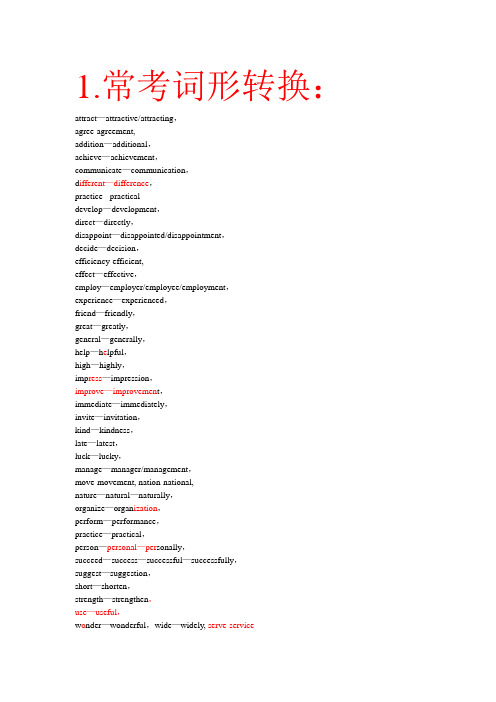
1.常考词形转换:attract—attractive/attracting,agree-agreement,addition—additional,achieve—achievement,communicate—communication,d ifferent—difference,practice - practicaldevelop—development,direct—directly,disappoint—disappointed/disappointment,decide—decision,efficiency-efficient,effect—effective,employ—employer/employee/employment,experience—experienced,friend—friendly,great—greatly,general—generally,help—h e lpful,high—highly,imp ress—impression,improve—improvemen t,immediate—immediately,invite—invitation,kind—kindness,late—latest,luck—lucky,manage—manager/management,move-movement, nation-national,nature—natural—naturally,organize—organ ization,perform—performance,practice—practical,person—personal—per sonally,succeed—success—successful—successfully,suggest—suggestion,short—shorten,strength—strengthen,use—useful,w o nder—wonderful,wide—widely, serve-service2.形容词和副词。
英语b级知识点总结
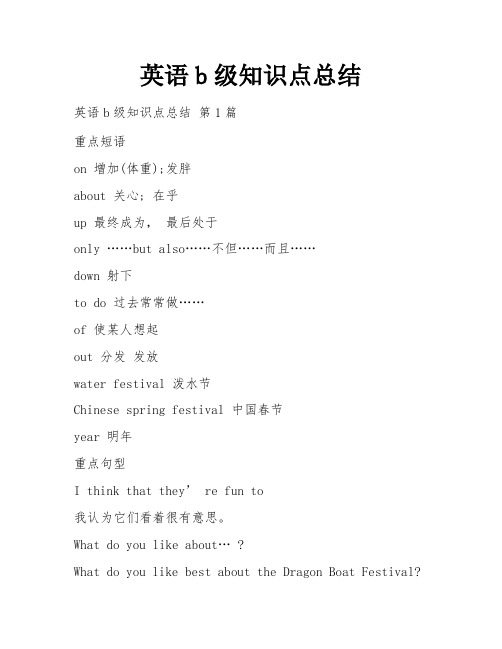
英语b级知识点总结英语b级知识点总结第1篇重点短语on 增加(体重);发胖about 关心; 在乎up 最终成为,最后处于only ……but also……不但……而且……down 射下to do 过去常常做……of 使某人想起out 分发发放water festival 泼水节Chinese spring festival 中国春节year 明年重点句型I think that they’ re fun to我认为它们看着很有意思。
What do you like about… ?What do you like best about the Dragon Boat Festival?关于端午节,你最喜欢什么?What a great day!多么美好的一天!4 .1 wonder if…I wonder if it’s similar to the Water Festival of the Dai people in Yunnan我想知道它是否与云南傣族的泼水节相似。
How+ + 主 + 谓!How fantastic the dragon boat teams were!龙舟队多棒啊!+ 名词+主语+谓语!What an interesting book it is!它是一本多么有趣的书啊!初中英语必备知识宾语从句的语序问题以上介绍了三种宾语从句,同学们一定要注意,在疑问词或if/whether引导的宾语从句中,一定要用陈述句语序。
asked how old IWe don’t know where her officeMy teacher wanted to know if I like宾语从句的时态问题一般情况下宾语从句的时态必须和主句的时态保持一致:当主句的谓语动词是一般现在时时,宾语从句中的谓语动词不受时态限制。
says that she is aShe says that she was a student two yearsShe says that she will be a college studentShe says that she has been a college student for 3当主句的谓语动词是过去时时,宾语从句中只能用过去的某种时态。
英语b级语法、词组、单词集合
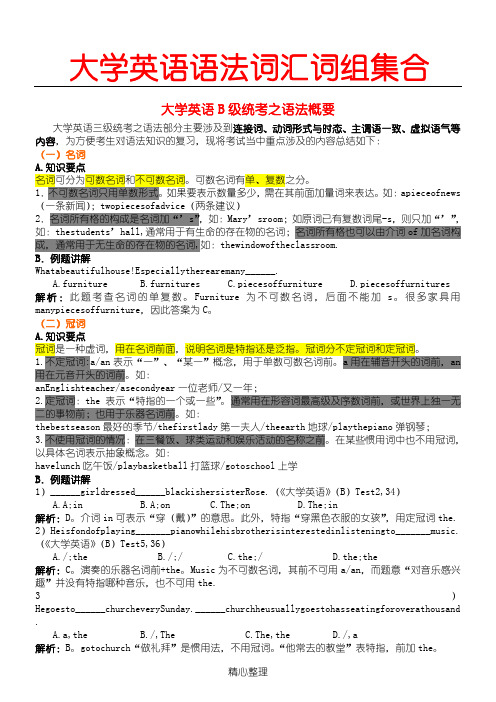
大学英语语法词汇词组集合大学英语B级统考之语法概要大学英语三级统考之语法部分主要涉及到连接词、动词形式与时态、主谓语一致、虚拟语气等内容,为方便考生对语法知识的复习,现将考试当中重点涉及的内容总结如下:(一)名词A.知识要点名词可分为可数名词和不可数名词。
可数名词有单、复数之分。
1.不可数名词只用单数形式。
如果要表示数量多少,需在其前面加量词来表达。
如:apieceofnews (一条新闻);twopiecesofadvice(两条建议)2.名词所有格的构成是名词加“’s”,如:Mary’sroom;如原词已有复数词尾-s,则只加“’”,如:thestudents’hall,通常用于有生命的存在物的名词;名词所有格也可以由介词of加名词构成,通常用于无生命的存在物的名词,如:thewindowoftheclassroom.B.例题讲解Whatabeautifulhouse!Especiallytherearemany______.A.furnitureB.furnituresC.piecesoffurnitureD.piecesoffurnitures 解析:此题考查名词的单复数。
Furniture为不可数名词,后面不能加s。
很多家具用manypiecesoffurniture,因此答案为C。
(二)冠词A.知识要点冠词是一种虚词,用在名词前面,说明名词是特指还是泛指。
冠词分不定冠词和定冠词。
1.不定冠词:a/an表示“一”、“某一”概念,用于单数可数名词前。
a用在辅音开头的词前,an 用在元音开头的词前。
如:anEnglishteacher/asecondyear一位老师/又一年;2.定冠词:the表示“特指的一个或一些”。
通常用在形容词最高级及序数词前,或世界上独一无二的事物前;也用于乐器名词前。
如:thebestseason最好的季节/thefirstlady第一夫人/theearth地球/playthepiano弹钢琴;3.不使用冠词的情况:在三餐饭、球类运动和娱乐活动的名称之前。
英语b级语法、词组、单词集合
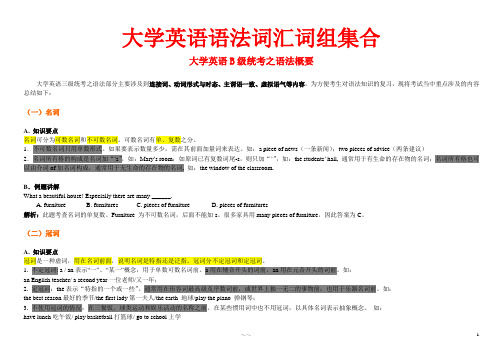
大学英语语法词汇词组集合大学英语B级统考之语法概要大学英语三级统考之语法部分主要涉及到连接词、动词形式与时态、主谓语一致、虚拟语气等内容,为方便考生对语法知识的复习,现将考试当中重点涉及的内容总结如下:(一)名词A. 知识要点名词可分为可数名词和不可数名词。
可数名词有单、复数之分。
1.不可数名词只用单数形式。
如果要表示数量多少,需在其前面加量词来表达。
如:a piece of news(一条新闻);two pieces of advice(两条建议)2.名词所有格的构成是名词加“’s”,如:Mary’s room;如原词已有复数词尾-s,则只加“’”,如:the students’ hall, 通常用于有生命的存在物的名词;名词所有格也可以由介词of加名词构成,通常用于无生命的存在物的名词, 如:the window of the classroom.B.例题讲解What a beautiful house! Especially there are many ______.A. furnitureB. furnituresC. pieces of furnitureD. pieces of furnitures解析:此题考查名词的单复数。
Furniture 为不可数名词,后面不能加s。
很多家具用many pieces of furniture,因此答案为C。
(二)冠词A. 知识要点冠词是一种虚词,用在名词前面,说明名词是特指还是泛指。
冠词分不定冠词和定冠词。
1. 不定冠词: a / an表示“一”、“某一”概念,用于单数可数名词前。
a用在辅音开头的词前,an用在元音开头的词前。
如:an English teacher/ a second year一位老师/又一年;2. 定冠词:the表示“特指的一个或一些”。
通常用在形容词最高级及序数词前,或世界上独一无二的事物前;也用于乐器名词前。
如:the best season最好的季节/the first lady第一夫人/the earth 地球/play the piano 弹钢琴;3. 不使用冠词的情况:在三餐饭、球类运动和娱乐活动的名称之前。
大学英语b级语法重点

大学英语B级语法重点(总6页)--本页仅作为文档封面,使用时请直接删除即可----内页可以根据需求调整合适字体及大小--大学英语B级统考之语法概要动词的基本时态A. 知识要点1.一般现在时态动词形式为do 或does (第三人称单数)。
通常表示客观事实或真理;或表示经常发生的、习惯性的动作或存在的状态。
. He always goes to school by bike.他总是骑车去上学。
2.一般过去时态动词形式为did. 表示过去时间所发生的动作或存在的状态,常与过去特定的时间状语连用;或表示过去某一段时间一直持续或反复发生的动作,可与表示频度的时间副词连用。
. I bought this computer five years ago.我在五年前买了这台电脑。
3.一般将来时态动词形式为will do/ shall do /be going to do. 表达在未来某个时间将要发生的动作或存在的状态。
. The telephone is ringing. I will answer it.电话在响,我去接。
4.现在进行时态动词形式为is/am/are+ doing,表示此时此刻或现阶段正在进行的动作。
. The police are looking for the two missing children.警察们正在寻找两个丢失的孩子。
5.过去进行时态动词形式为 was/were + doing,表示过去某个时刻正在进行的动作。
(主语是I,she,he时用was). Jane burnt her hand when she was cooking the dinner.当简在煮晚饭时她的手被烧伤了。
6.现在完成时态动词形式为have / has done,常与already,recently, never,ever, yet,since连用。
用来表示过去发生的对现在有影响的动作。
. The milk has already become undrinkable 牛奶已经不能喝了。
大学英语B级考试语法

Summary:
一般时 现在时 do/doe s 过去时 将来时 did will do 进行时 am/is /are doing was/were doing will be doing 完成时 have/has done had done will have done 完成进行时 have/has been doing had been doing
(不规则变化) 例如: drink——drunk, see——saw, run——ran, eat——ate, do—— did
• 练习: was (1) I _____ (be) a student last year, but now I’m a teacher. had (2) He _____ (have) breakfast with Lily then. saw (3) I _____ (see) him that day as soon as got he _____(get) off the bus. destroyed (destroy) by the (4) Our home _____ flood last month. carried (5) Lily _____ (carry) her little dog to the meeting last Friday.
构成: 一般过去时态由谓语动词的过去式表示 (1) am/is—— was,are—— were (2) have—— had 实义动词的过去式分规则和不规则变化两种: (规则变化) • 1.原形动词后加“-ed”或“-d”,例如: work—— worked,turn——turned live——lived • 2.以辅音字母+y结尾的,先变y为i再加“-ed”, 例如: carry—— carried • 3.但以元音+y结尾的,直接加“-ed”,例如: play——played,destroy-destroyed。 • 4.以重读闭音节结尾的,双写末尾辅音字母,再加 “-ed”。例如:stop-stopped。
B级英语语法总结
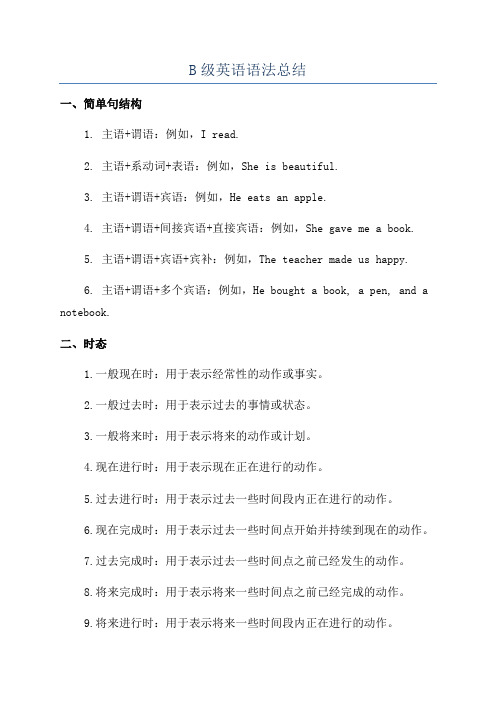
B级英语语法总结一、简单句结构1. 主语+谓语:例如,I read.2. 主语+系动词+表语:例如,She is beautiful.3. 主语+谓语+宾语:例如,He eats an apple.4. 主语+谓语+间接宾语+直接宾语:例如,She gave me a book.5. 主语+谓语+宾语+宾补:例如,The teacher made us happy.6. 主语+谓语+多个宾语:例如,He bought a book, a pen, and a notebook.二、时态1.一般现在时:用于表示经常性的动作或事实。
2.一般过去时:用于表示过去的事情或状态。
3.一般将来时:用于表示将来的动作或计划。
4.现在进行时:用于表示现在正在进行的动作。
5.过去进行时:用于表示过去一些时间段内正在进行的动作。
6.现在完成时:用于表示过去一些时间点开始并持续到现在的动作。
7.过去完成时:用于表示过去一些时间点之前已经发生的动作。
8.将来完成时:用于表示将来一些时间点之前已经完成的动作。
9.将来进行时:用于表示将来一些时间段内正在进行的动作。
三、语态1.主动语态:表示主语主动进行的动作或状态。
2.被动语态:表示主语被动地接受动作或处于其中一种状态。
四、名词1.可数名词:表示可以计数的名词,有单数和复数形式。
2.不可数名词:表示不能计数的名词,只有单数形式。
3.特殊名词:表示一种事物的名称,如国家、地区、语言、民族、学科、职业等。
五、冠词1.定冠词:用于特指一个已知的名词。
2.不定冠词:用于泛指或表示一个未知的名词。
3.零冠词:用于表示一般概念或抽象名词。
六、代词1.人称代词:用于代替人或事物。
2.物主代词:表示所有关系或归属关系的代词。
3.反身代词:表示动作的主体和宾语是同一人或同一物。
4.指示代词:用于指示一些人或事物。
5.不定代词:用于指代泛指的人或事物。
6.疑问代词:用于提问人或事物的身份、性质等。
B级语法总结
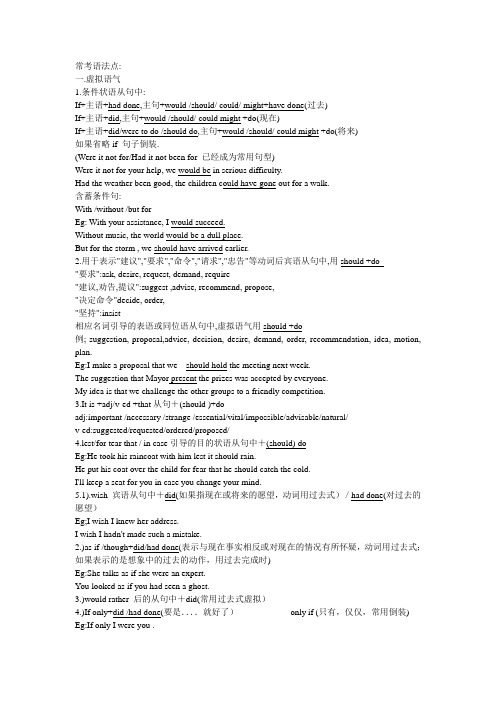
常考语法点:一.虚拟语气1.条件状语从句中:If+主语+had done,主句+would /should/ could/ might+have done(过去)If+主语+did,主句+would /should/ could might +do(现在)If+主语+did/were to do /should do,主句+would /should/ could might +do(将来)如果省略if 句子倒装.(Were it not for/Had it not been for 已经成为常用句型)Were it not for your help, we would be in serious difficulty.Had the weather been good, the children could have gone out for a walk.含蓄条件句:With /without /but forEg: With your assistance, I would succeed.Without music, the world would be a dull place.But for the storm , we should have arrived earlier.2.用于表示"建议","要求","命令","请求","忠告"等动词后宾语从句中,用should +do"要求":ask, desire, request, demand, require"建议,劝告,提议":suggest ,advise, recommend, propose,"决定命令"decide, order,"坚持":insist相应名词引导的表语或同位语从句中,虚拟语气用should +do例; suggestion, proposal,advice, decision, desire, demand, order, recommendation, idea, motion, plan.Eg:I make a proposal that we should hold the meeting next week.The suggestion that Mayor present the prizes was accepted by everyone.My idea is that we challenge the other groups to a friendly competition.3.It is +adj/v-ed +that从句+(should )+doadj:important /necessary /strange /essential/vital/impossible/advisable/natural/v-ed:suggested/requested/ordered/proposed/4.lest/for tear that / in case引导的目的状语从句中+(should) doEg:He took his raincoat with him lest it should rain.He put his coat over the child for fear that he should catch the cold.I'll keep a seat for you in case you change your mind.5.1).wish 宾语从句中+did(如果指现在或将来的愿望,动词用过去式)/had done(对过去的愿望)Eg;I wish I knew her address.I wish I hadn't made such a mistake.2.)as if /though+did/had done(表示与现在事实相反或对现在的情况有所怀疑,动词用过去式;如果表示的是想象中的过去的动作,用过去完成时)Eg:She talks as if she were an expert.Y ou looked as if you had seen a ghost.3.)would rather 后的从句中+did(常用过去式虚拟)4.)If only+did /had done(要是....就好了)only if (只有,仅仅,常用倒装) Eg:If only I were you .Only if the students get the permission can they enter the classroom.6.It is high time+that +didEg:It is time we went to bed.It is time we took measures to protect environment.二.非谓语动词:顾名思义,非谓语动词就是不能作谓语的动词。
英语B级考试语法

History is made by the people.
The Eiffel Tower was completed in 1889.
02
More subway lines will be built in the future.
English has been studied for 3 years by us at school.
4
Advances in medical technology have made it possible for people (live)______ longer.
固定搭配
分词作状语
Customers consider location as the first factor when _____ a decision about buying a house. A. make B. made C. to make D. making Make 和逻辑主语customers 之间是主动关系 They talked to him for hours, (try)_____ to persuade him to change his mind. 现在分词作目的状语,逻辑主语必须与主句相同。
The new machine ought to (test)____ before it is put to use.
If you smoke in this non-smoking area, you will (fine)______ $50.
虚拟语气 subjective mood 表示所说的话只是一种主观的愿望、假想和建议等。
带to的不定式作主语时。常用形式主语it代替,其作表语的形容词有important, easy, difficult, hard, good ,bad, right 等。
大学英语B级语法

大学英语B级统考之语法概要大学英语B级统考之语法部分主要涉及到连接词、动词形式与时态、主谓语一致、虚拟语气等内容,为方便考生对语法知识的复习,现将考试当中重点涉及的内容总结如下:(一)名词A. 知识要点名词可分为可数名词和不可数名词。
可数名词有单、复数之分。
1.不可数名词只用单数形式。
如果要表示数量多少,需在其前面加量词来表达。
如:a piece of news(一条新闻);two pieces of advice(两条建议)2.名词所有格的构成是名词加“’s”,如:Mary’s room;如原词已有复数词尾-s,则只加“’”,如:the students’hall, 通常用于有生命的存在物的名词;名词所有格也可以由介词of加名词构成,通常用于无生命的存在物的名词, 如:the window of the classroom.B.例题讲解What a beautiful house! Especially there are many ______.A. furnitureB. furnituresC. pieces of furnitureD. pieces of furnitures解析:此题考查名词的单复数。
Furniture 为不可数名词,后面不能加s。
很多家具用many pieces of furniture,因此答案为C。
(二)冠词A. 知识要点冠词是一种虚词,用在名词前面,说明名词是特指还是泛指。
冠词分不定冠词和定冠词。
1. 不定冠词: a / an表示“一”、“某一”概念,用于单数可数名词前。
a用在辅音开头的词前,an用在元音开头的词前。
如:an English teacher/ a second year一位老师/又一年;2. 定冠词:the表示“特指的一个或一些”。
通常用在形容词最高级及序数词前,或世界上独一无二的事物前;也用于乐器名词前。
如:the best season最好的季节/the first lady第一夫人/the earth 地球/play the piano 弹钢琴;3. 不使用冠词的情况:在三餐饭、球类运动和娱乐活动的名称之前。
B级考试常考语法总结

B级考试常考语法总结从历年考试试题分析来看,PRETCO语法(Structure)考查重点主要是:动词时态和语态、非谓语动词(动词不定式、分词和动名词)、情态动词、状语从句、定语从句、倒装句、强调句、反意问句、虚拟语气、代词、形容词和副词等。
考生要对上述语法项目从概念到应用上下功夫。
现就各项目的考核重点分别简单叙述如下(其中有些例句选自历年考试试题):一、动词的时态和语态考核重点:●过去完成时。
注意:过去完成时常常和before,after,until,when等引导的时间状语从句连用,其谓语动词的动作一般表示过去。
常用句型如下:by the time(the end)of+表示过去时间的短语或句子;hardly (scarcely)+过去完成时+when+过去时;no sooner+过去完成时+than+过去时;●现在完成时和现在完成进行时。
常用时间状语有:this day(week,month,year),so far,for some time,up to now,up to the present,all this year(month,week)等;●将来完成时。
常与before,until,when,after等连词引导的时间状语从句连用,其谓语动词的动作一般表示将来。
常用句型如下:by the time(the end)0f+表示将来时间的短语或句子。
例句:1.He said:“I______ a lot of new words by the end of last year.”(2002.12 B级)A) had already learnt B)would have already learntC) have already learnt D)already learnt答案:A 。
句中时间状语by the end of last year表明谓语动词要用过去完成时态。
2. The project to clear up the polluted river ______ by the end of next year.(2002.6 B级)A) is being completed B)will have been completedC) has been completed D)will have completed答案:B 。
英语b级语法、词组、单词集合

大学英语语法词汇词组集合大学英语B级统考之语法概要大学英语三级统考之语法部分主要涉及到连接词、动词形式与时态、主谓语一致、虚拟语气等内容,为方便考生对语法知识的复习,现将考试当中重点涉及的内容总结如下:(一)名词A. 知识要点名词可分为可数名词和不可数名词。
可数名词有单、复数之分。
1.不可数名词只用单数形式。
如果要表示数量多少,需在其前面加量词来表达。
如:a piece of news(一条新闻);two pieces of advice(两条建议)2.名词所有格的构成是名词加“’s”,如:Mary’s room;如原词已有复数词尾-s,则只加“’”,如:the students’ hall, 通常用于有生命的存在物的名词;名词所有格也可以由介词of加名词构成,通常用于无生命的存在物的名词, 如:the window of the classroom.B.例题讲解What a beautiful house! Especially there are many ______.A. furnitureB. furnituresC. pieces of furnitureD. pieces of furnitures解析:此题考查名词的单复数。
Furniture 为不可数名词,后面不能加s。
很多家具用many pieces of furniture,因此答案为C。
(二)冠词A. 知识要点冠词是一种虚词,用在名词前面,说明名词是特指还是泛指。
冠词分不定冠词和定冠词。
1. 不定冠词: a / an表示“一”、“某一”概念,用于单数可数名词前。
a用在辅音开头的词前,an用在元音开头的词前。
如:an English teacher/ a second year一位老师/又一年;2. 定冠词:the表示“特指的一个或一些”。
通常用在形容词最高级及序数词前,或世界上独一无二的事物前;也用于乐器名词前。
如:the best season最好的季节/the first lady第一夫人/the earth 地球/play the piano 弹钢琴;3. 不使用冠词的情况:在三餐饭、球类运动和娱乐活动的名称之前。
大学英语B级语法重点

大学英语B级统考之语法概要动词的基本时态A. 知识要点1.一般现在时态动词形式为do 或does (第三人称单数)。
通常表示客观事实或真理;或表示经常发生的、习惯性的动作或存在的状态。
e.g. He always goes to school by bike.他总是骑车去上学。
2.一般过去时态动词形式为did. 表示过去时间所发生的动作或存在的状态,常与过去特定的时间状语连用;或表示过去某一段时间一直持续或反复发生的动作,可与表示频度的时间副词连用。
e.g. I bought this computer five years ago.我在五年前买了这台电脑。
3.一般将来时态动词形式为will do/ shall do /be going to do. 表达在未来某个时间将要发生的动作或存在的状态。
e.g. The telephone is ringing. I will answer it.电话在响,我去接。
4.现在进行时态动词形式为is/am/are+ doing,表示此时此刻或现阶段正在进行的动作。
e.g. The police are looking for the two missing children.警察们正在寻找两个丢失的孩子。
5.过去进行时态动词形式为was/were + doing,表示过去某个时刻正在进行的动作。
(主语是I,she,he时用was)e.g. Jane burnt her hand when she was cooking the dinner.当简在煮晚饭时她的手被烧伤了。
6.现在完成时态动词形式为have / has done,常与already,recently,never,ever, yet,since连用。
用来表示过去发生的对现在有影响的动作。
e.g. The milk has already become undrinkable 牛奶已经不能喝了。
英语b级语法、词组、单词集合

大学英语语法词汇词组集合大学英语B级统考之语法概要大学英语三级统考之语法部分主要涉及到连接词、动词形式与时态、主谓语一致、虚拟语气等内容,为方便考生对语法知识的复习,现将考试当中重点涉及的内容总结如下:(一)名词A. 知识要点名词可分为可数名词和不可数名词。
可数名词有单、复数之分。
1.不可数名词只用单数形式。
如果要表示数量多少,需在其前面加量词来表达。
如:a piece of news(一条新闻);two pieces of advice(两条建议)2.名词所有格的构成是名词加“’s”,如:Mary’s room;如原词已有复数词尾-s,则只加“’”,如:the students’ hall, 通常用于有生命的存在物的名词;名词所有格也可以由介词of加名词构成,通常用于无生命的存在物的名词, 如:the window of the classroom.B.例题讲解What a beautiful house! Especially there are many ______.A. furnitureB. furnituresC. pieces of furnitureD. pieces of furnitures解析:此题考查名词的单复数。
Furniture 为不可数名词,后面不能加s。
很多家具用many pieces of furniture,因此答案为C。
(二)冠词A. 知识要点冠词是一种虚词,用在名词前面,说明名词是特指还是泛指。
冠词分不定冠词和定冠词。
1. 不定冠词: a / an表示“一”、“某一”概念,用于单数可数名词前。
a用在辅音开头的词前,an用在元音开头的词前。
如:an English teacher/ a second year一位老师/又一年;2. 定冠词:the表示“特指的一个或一些”。
通常用在形容词最高级及序数词前,或世界上独一无二的事物前;也用于乐器名词前。
如:the best season最好的季节/the first lady第一夫人/the earth 地球/play the piano 弹钢琴;3. 不使用冠词的情况:在三餐饭、球类运动和娱乐活动的名称之前。
- 1、下载文档前请自行甄别文档内容的完整性,平台不提供额外的编辑、内容补充、找答案等附加服务。
- 2、"仅部分预览"的文档,不可在线预览部分如存在完整性等问题,可反馈申请退款(可完整预览的文档不适用该条件!)。
- 3、如文档侵犯您的权益,请联系客服反馈,我们会尽快为您处理(人工客服工作时间:9:00-18:30)。
词性部分1.名词的词性转换:-ion suggestion,action,reaction, solution, permission-ation invitation, imagination, operation, application, explanation-ment argument, equipment, employment, agreement, arrangement, amusement-ence\ance evidence , confidence, existence, difference,importance, appearance-y honesty, difficulty, poverty, reality, variety,-er reader ruler manager, follower,-or operator actor-ee employee trainee-th growth truth depth-ness happiness, illness, sickness, goodness, coldness, fitness,-ility possibility responsibility-al arrival, withdrawal, disposal, denial-age shortage, usage, courage, leakage, marriage-ief belief, relief典型考题:1. We have been informed that the (equip) ______ will be arriving here in ten days.2. I sincerely thank you for your (invite)______ to the Industrial Exhibition3. I am sorry to learn that you have made no (improve) ______ on the design at all.4. The right side of the brain controls our (imagine) __________, our understanding ofspace and color.5. There is a rapid increase in population in that country that has caused a food (short)___________ .6. I was told that Disney World is one of Florida’s major (tour) _________ attractions.7. There has been a large (grow) ________ of light industries during these years.8. There were only a few (survive) ______ from the air-crash.9. The committee expects to come to a (decide) _____ within this week.10. The boss has promised a wage increase for all the (employ) _______.KEY1. equipment2. invitation3. improvement4. imagination5. shortage6. tourist7. growth8. survivors9. decision 10. employees2.形容词的词性转换:1.作定语,2.作表语,放在系动词的后面。
3.形容词的比较级和最高级-ful beautiful wonderful careful,thoughtful,useful,-able acceptable reasonable,reliable,valuable,-less useless careless-ing willing annoying,entertaining-ive active creative attractive,effective,-ed pleased delighted-al traditional personal additional-ly friendly,lively, lovely,lonely, fatherly, costly,woodly3.副词的词性转换1.adv.+v, v+adv.2.adv.+adj3.adv,+句子典型考题:1.He was (serious) ___________ injured in the accident.2. “But why on earth did you agree to the proposal?” I asked (curious) ___________.3.When she heard that her father was (danger) ________ ill, she burst into tears.4That was (apparent) __________ a careless mistake caused by the operator.5. (Luck) _________, the flood did not do much damage to the crops.6. The poor peasants were (heavy) _________ taxed.7. (person)________, I don’t agree with you though we are good friends.KEY:1.seriously2.curiously3.dangerously4.apparently5.luckily6.heavily7personaly语法部分I.动词的时态时态是谓语动词的形式,表示动作发生的时间和所处的状态。
英语的时态共有十六种。
一般时态进行时态完成时态完成进行时态现在do/does ,am/is/are doing,have/has done ,have/has been doing过去did ,was/were doing ,had done ,had been doing将来shall/will do,shall/will be doing ,shall/will have done,shall/will have been doing过去将来should/would do,should/would be doing,should/would have done,should/would have been doing但其中《大纲》要求的主要有以下十种:一般现在时、一般过去时、一般将来时、过去将来时、现在进行时、过去进行时、将来进行时、现在完成时、过去完成时、现在完成进行时。
(一)一般现在时1.表示经常性的动作和状态,常与always, every day, never, often, usually, sometimes等频度副词连用;说话时人和事物的特性或状态;客观真理等。
I usually go to work at seven in the morning.Is there anything wrong with you? You look pale.The earth moves round the sun.I-------ping-pong quite well, but I haven`t had time to play since the new year.A.will playB. have playedC. playedD. play答案选D。
本题干后一分句用了转折语气,并用了现在完成时,表示自从新年以来一直没用打过乒乓球,由此排除选项A和C。
空格处是指含现在时间在内的广泛意义上的现在时间。
2.表示计划或安排中的动作。
The train leaves for Guangzhou at 2:30 p.m.3.在(when)时间和(if)条件状语从句中,表示一般将来时。
考题1:---When will you come to see me, Dad?---I will go to see you when you _______ the training course.A will have finished B. will finish C .are finishing D. finish考题2:China will be the largest market for automobiles in 20 to 25 years if the country’seconomy __________ to grow at the current rate.A. continuesB. has continuedC. continuedD. has been continued答案选DA(二)一般过去时1.表示过去所发生的动作或状态。
My friend worked in Beijing for two years. He went to France last year.---You haven`t said a word about my new coat, Brenda. Do you like it?---I`m sorry I _______anything about it sooner. I certainly think it`s pretty on you.A.wasn`t sayingB. don`t sayC. won`t sayD. didn`t say答案是D。
2.过去的习惯。
When I was at college, I went to the library every afternoon.3.先后一连串动作。
The old lady went to the market ,bought some vegetables and went home.4.用于虚拟语气It is time we went home.(三)一般将来时表示将来要发生的动作或状态,常与表示将来的时间状语连用1.Will / shall + do(1)表示预见、意图或用在疑问句中征询听话人的意见。
